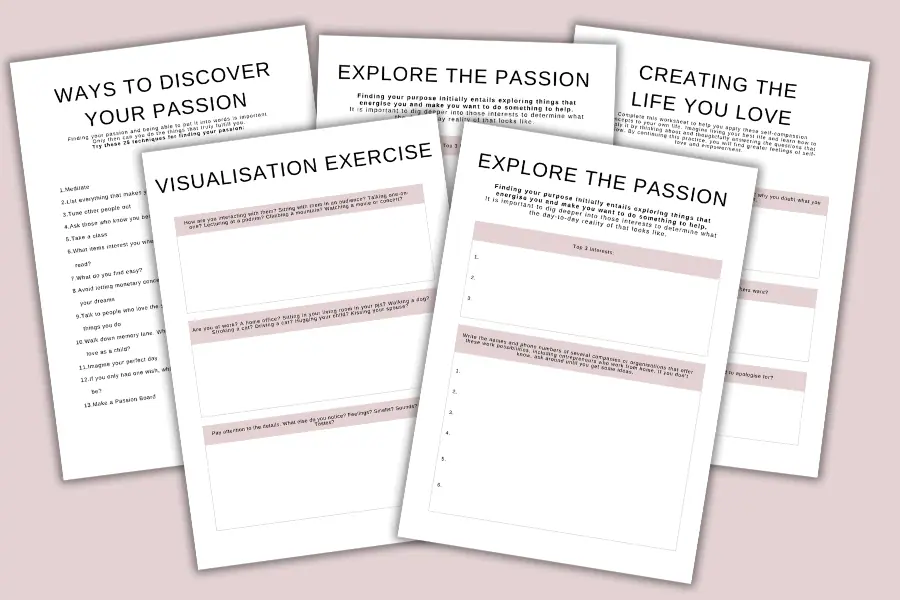How To Write Affirmations That Inspire Growth

Ever wondered how a few simple words can spark a profound change in your life? That’s the magic of affirmations—powerful statements that can shift your mindset, boost your confidence, and set you on a path to success and fulfilment. At first, the idea might seem too good to be true. I get it; I was there once, too.
Imagine starting your day not with worries and doubts but with a firm belief in your abilities and worth. “I am deserving of happiness and success.” This simple act of affirming your worth can shift your mindset from one of limitation to one of endless possibilities. It’s like putting on a pair of glasses that change how you see the world—suddenly, challenges become opportunities, and setbacks become lessons. Understanding how to write affirmations can have a positive impact on your mental health and help you achieve your dreams.
This blog post is about how to write affirmations

What Are Affirmations?
At their core, affirmations are positive statements that you repeat to yourself, designed to challenge and overcome self-sabotaging and negative thoughts. They’re not just feel-good quotes or motivational one-liners; they’re personal declarations of your values, goals, and who you aspire to be.
But why are affirmations such a game-changer, especially for our mental health and well-being? It’s because our thoughts have immense power over our feelings and actions. Negative self-talk can be like a heavy chain holding us back, leading to a cycle of doubt and fear. Affirmations work by breaking this cycle, replacing doubt with belief and fear with courage. Understanding the significance of affirmations and how to write affirmations to suit your dreams and desires can be profound.
In essence, affirmations are a powerful tool for mental health because they allow us to take control of our narrative. Instead of being passive recipients of external circumstances, we become active creators of our reality. By regularly affirming our strengths and worth, we build a resilient mindset that supports growth, well-being, and fulfilment.
Why Affirmations Work
Have you ever wondered if there’s a science to the sometimes mystical-feeling effects of affirmations? The answer lies in two powerful concepts: positive self-talk and neuroplasticity. Let’s break these down into bite-sized pieces.
Positive Self Talk
Positive self-talk is essentially the inner dialogue you have with yourself, which can be uplifting or critical. When this inner dialogue consists of affirmations, it acts like a gardener, carefully tending to the garden of your mind, encouraging the growth of positive thoughts and beliefs.
Neuroplasticity
Neuroplasticity, on the other hand, is our brain’s remarkable ability to reorganise itself by forming new neural connections throughout life. This means our brains are not hardwired to remain in a fixed state but can change and adapt in response to our experiences, thoughts, and emotions. When we practice affirmations, we’re essentially wiring our brains to adopt a more positive and empowering narrative.
By consistently practising affirmations, you can rewire your brain to focus on your strengths and potential rather than your perceived failures. It’s a powerful reminder that we hold the keys to our mental transformation.
Getting Started With Affirmations
Embarking on the journey of how to write affirmations begins with a moment of introspection. It’s time to pause and reflect on your life’s canvas—what you’ve painted so far and what you wish to change. Whether it’s seeking success in your career, finding love, nurturing self-esteem, or simply cultivating a more positive outlook, affirmations can be the brush you use to add vibrant new colours to your picture.
To get started, I encourage you to write down the areas you’ve identified. Seeing them on paper makes them more tangible, more real. Then, for each area, craft an affirmation that speaks directly to the heart of what you wish to change or achieve. If it’s confidence, your affirmation might be, “I am confident in my abilities and make valuable contributions.” If it’s love, perhaps, “I am deserving of love and open to receiving it.” The key is to make these affirmations personal and positive, reflecting the new reality you wish to create.
Remember, affirmations are not about denying the challenges you face but about empowering yourself to navigate through them with a stronger, more positive mindset. As you begin this practice, allow yourself to be patient and gentle. Transformation doesn’t happen overnight, but with consistent effort, the changes you’ll see in yourself and your life can be profound.
How to Write Effective Affirmations
Learning to write affirmations that resonate with you and your goals doesn’t have to be a daunting task. In fact, with a few simple steps, you can create powerful statements that inspire change and foster growth. Here’s how to get started:
Key Steps
Start with the present tense
Affirmations are most effective when they are stated in the present tense as if they are already true. This helps your mind accept them as reality, not just a future possibility.
Be positive
Focus on what you want to attract or become, not on what you want to avoid. Your brain tends to skip over negatives, so phrases like “I am not afraid of public speaking” might be less effective than “I am confident and calm when speaking in public.”
Keep it personal
Use “I” statements to make your affirmations deeply personal and focused on your own journey.
Make it specific
Vague affirmations can be less impactful. Be as specific as possible about what you wish to achieve or how you want to feel.
Infuse it with emotion
Emotional energy can supercharge your affirmations. Think about how achieving this goal would make you feel and include that emotion in your statement.
Examples of Effective Affirmations:
For Confidence: “I am radiating confidence and self-belief in every action I take.”
For Success: “I am achieving my goals with determination and clarity, celebrating every success along the way.”
For Happiness: “I am embracing joy in every moment, finding happiness in the small things.”
For Health: “I am nurturing my body with love and healthy choices, feeling stronger and more vibrant every day.”
For Love: “I am open to receiving love and kindness, cultivating meaningful relationships that enrich my life.”
Remember, the most powerful affirmations are those that resonate with you personally. They should feel like a warm, encouraging hand on your back, propelling you forward. Start by writing a few affirmations that align with your goals and aspirations. Repeat them daily, ideally in the morning to set a positive tone for your day or during moments of doubt as a reminder of your strength and capability.
Crafting your own affirmations is a personal journey, one that reflects your unique desires and challenges. As you practice, you’ll find that some affirmations resonate more deeply than others. Embrace this process of discovery, and don’t hesitate to revise your affirmations as you grow and evolve.
Incorporating Affirmations into Daily Life
Integrating affirmations into your daily life is like planting a garden. It’s not enough to simply plant the seeds; you must water them, ensure they get enough sunlight and tend to them regularly. Similarly, for affirmations to truly take root and flourish, they need to become a part of your daily routine.
Your Daily Routine
Set a specific time for your affirmations
Just as you might schedule time for exercise or meditation, set aside a few minutes each day for your affirmations. Morning can be a powerful time to set a positive tone for the day ahead, but choose a time that feels right for you.
Use technology to your advantage
Set reminders on your phone or use an app dedicated to affirmations. These can serve as prompts to pause for a moment and affirm your intentions for the day.
Create affirmation triggers
Associate your affirmations with daily activities or routines. For example, repeat your affirmations while you’re brushing your teeth, waiting for your morning coffee to brew, or right before you start your workday. These triggers can help ensure you don’t forget to practice your affirmations.
Write them down
Keep a journal of your affirmations or post them in places where you’ll see them regularly, like your bathroom mirror, refrigerator, or workspace. The act of writing reinforces the affirmations, and seeing them throughout the day keeps them on top of your mind.
Speak them out loud
There’s power in vocalising your affirmations. Hearing your own voice declare your positive intentions adds weight and reality to them. If you’re comfortable, do this in front of a mirror to strengthen the connection between your words and your self-image.
Personal Tips for Making Affirmations a Habit
When I began incorporating affirmations into my daily life, I found a few practices particularly helpful:
Start small
I began with just one affirmation, repeated five times every morning. This made the practice manageable and not overwhelming.
Be patient and kind to yourself
Some days, my affirmations felt like they were just words, and I struggled to believe them. I learned to be gentle with myself, acknowledging that change takes time.
Celebrate your progress
Over time, I started to notice small shifts in my attitude and reactions. Celebrating these changes motivated me to keep going.
The Impact
Integrating affirmations into my daily routine has been transformative. It’s like learning a new language—the language of self-love and empowerment. Over time, this practice has helped me cultivate a more positive mindset, face challenges with resilience, and pursue my goals with confidence.
Overcoming Doubts and Challenges
Embarking on the journey of affirmations isn’t without its bumps in the road. It’s like deciding to jog every morning—some days, you leap out of bed ready to conquer the world, and other days, you wonder why you’re doing it at all. Let’s tackle some of these common doubts and challenges head-on.
“Do I Really Sound Like a Self-Help Book?”
The first few times you say your affirmations out loud, you might feel like you’ve stepped right out of a motivational seminar, complete with all the enthusiasm and none of the audience. It’s okay to laugh at yourself a bit here. Remember, every great change starts with feeling a bit silly. Imagine telling someone 20 years ago you’d pay money to throw coloured powder at yourself in a 5K run for fun. Things that seem odd at first can often become the most rewarding.
“But What If I Don’t Believe What I’m Saying?”
This is a big one. Repeating “I am successful and loved” on a bad hair day when you’ve missed your bus can feel downright ludicrous. But here’s the secret: affirmations are not about instant belief; they’re about gradual change. It’s like planting a tree. You don’t plant the seed and then sit outside tapping your foot, expecting it to grow overnight. Give your affirmations time to germinate and take root in your subconscious.
“It’s Just Too Simple to Be Effective, Right?”
It’s natural to doubt the efficacy of something as simple as repeating positive statements. After all, if it were that easy, wouldn’t everyone be doing it? Think of it this way: Brushing your teeth is simple, but it prevents cavities. Affirmations are mental hygiene—preventing decay of the spirit. Just because something is straightforward doesn’t mean it’s not powerful.
Overcoming the Hurdles
Start with humour
If you’re feeling self-conscious, make your first affirmation something like, “I am hilariously good at talking to myself.” Embrace the weirdness. Making light of the situation can help ease the tension and build a habit.
Scale it back
If saying affirmations feels like lying, scale them back. Instead of “I am the embodiment of success,” try “I am open to and working towards success.” It’s easier to believe and a good stepping stone.
Reflect on the changes
Keep a journal not just of your affirmations but of any small changes you notice in your thoughts, feelings, or experiences. This can help reinforce the effectiveness of your affirmations and motivate you to keep going.
The “Weirdness” Factor
Yes, talking to yourself with earnest positivity can feel odd initially. But remember, the most impactful changes often start with stepping out of our comfort zone. With time, what once felt strange becomes a source of strength and confidence.
Round Up
As we wrap up our journey through the world of how to write affirmations, it’s clear that these powerful, positive statements are more than just words—they’re tools for transformation. By intentionally crafting and repeating affirmations, we have the ability to reshape our thoughts, influence our emotions, and ultimately, direct the course of our lives towards greater fulfilment and success.
Affirmations are the gentle nudges that push us beyond our comfort zones, the whispers of courage when faced with doubt, and the declarations of our deepest truths and desires. They remind us of our strength, our worth, and our potential, encouraging us to act with confidence and live with purpose.
I invite you to share your journey with affirmations in the comments below. What affirmations have you found most impactful? Have you noticed changes in your mindset or your life since you started using them? Your story could be the inspiration someone else needs to start their own journey of transformation.
Remember, every great change starts with a single step. Let your affirmations be that step for you today. Embrace the process, be patient with yourself, and watch as your world begins to shift in response to your words.
This blog post was about how to write affirmations
Share this post: on Twitter on Facebook






